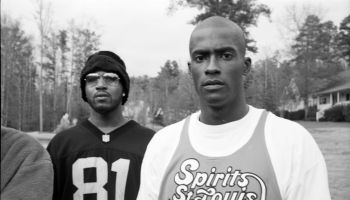VIA: New York Times
The icon is a very old man now. His hair is white, his body frail. Visitors say Nelson Mandela leans heavily on a cane when he walks into his study. He slips off his shoes, lowers himself into a stiff-backed chair and lifts each leg onto a cushioned stool. His wife, Graça, adjusts his feet “so they’re symmetrical, and gives him a peck,” says George Bizos, his old friend and lawyer.
To Mr. Mandela’s left is a small table piled with newspapers in English and Afrikaans, the language of the whites who imprisoned him for 27 years. Family and old comrades sit to his right, where his hearing is better. His memory has weakened, but he still loves to reminisce, bringing out oft-told stories “like polished stones,” as one visitor put it.
“There’s a quietness about him,” said Barbara Masekela, his chief of staff after his release from prison in 1990. “I find myself trying to amuse him, and I feel joyous when he breaks out in laughter.”
Mr. Mandela, perhaps the world’s most beloved statesman and a natural showman, has repeatedly announced his retirement from public life only to appear at a pop concert in his honor or a political rally. But recently, as he canceled engagements, rumors that he was gravely ill swirled so persistently in South Africa that his foundation released a statement saying he was “as well as anyone can expect of someone who is 91 years old.”
Yet even as Mr. Mandela fades from view, he retains a vital place in the public consciousness here. To many, he is still the ideal of a leader — warm, magnanimous, willing to own up to his failings — against which his political successors are measured and often found wanting. He is the founding father whose values continue to shape the nation.
“It’s the idea of Nelson Mandela that remains the glue that binds South Africa together,” said Mondli Makhanya, editor in chief of The Sunday Times. “The older he grows, the more fragile he becomes, the closer the inevitable becomes, we all fear that moment. There’s the love of the man, but there’s also the question: Who will bind us?”
There is a yearning for the exhilarating days when South Africa peacefully ended white racist rule, and a desire to understand the imperfect, big-hearted man who embodied that moment. Because of this, various historians and journalists are at work on a new round of books about Mr. Mandela.
The Nelson Mandela Foundation agreed last month to sell publishers in some 20 countries the rights to a book, “Conversations With Myself,” based on material from Mr. Mandela’s personal papers — jottings on envelopes, journals, desk calendars, drafts of intimate letters to relatives written in prison and documents from his years as South Africa’s first democratically chosen black president.
“He was and still is an obsessive record keeper,” said Verne Harris, who has been Mr. Mandela’s archivist since 2004 and will knit together the excerpts with Tim Couzens, a biographer. “The oldest records we have in that collection are his Methodist Church membership cards, the earliest one dated 1929. So he was 11 years old then.”
There are telling nuggets in unexpected places. In his prison years, the authorities gave him a South Africa tourist desk calendar each year. He typically recorded facts in it — his blood pressure, or whom he met that day — but occasionally he noted a dream, like one in which his daughter Zindzi, whom he was not allowed to see from when she was 3 years old until she was 15, “asks me to kiss her & remarks that I am not warm enough.”
The book will also draw on 71 hours of taped conversations that Mr. Mandela had with Richard Stengel, who collaborated with him on his autobiography, “Long Walk to Freedom,” and Ahmed Kathrada, Mr. Mandela’s prison comrade.
“One of the amazing, uncanny things was his memory,” said Mr. Stengel,who is writing a memoir of his time with Mr. Mandela, called “Mandela’s Way,” to be published in March.
“It was like he was watching a movie of his life and then narrating it,” Mr. Stengel, Time magazine’s managing editor, continued. “He would do voices of his father, of his teachers, of his prison guard.”
Read more here.














